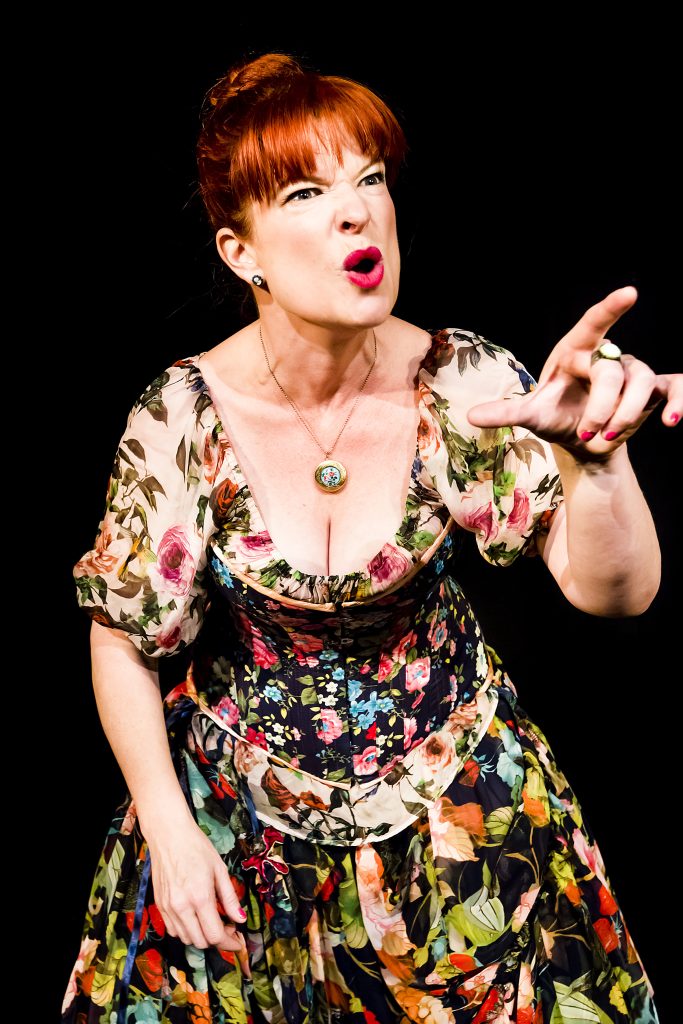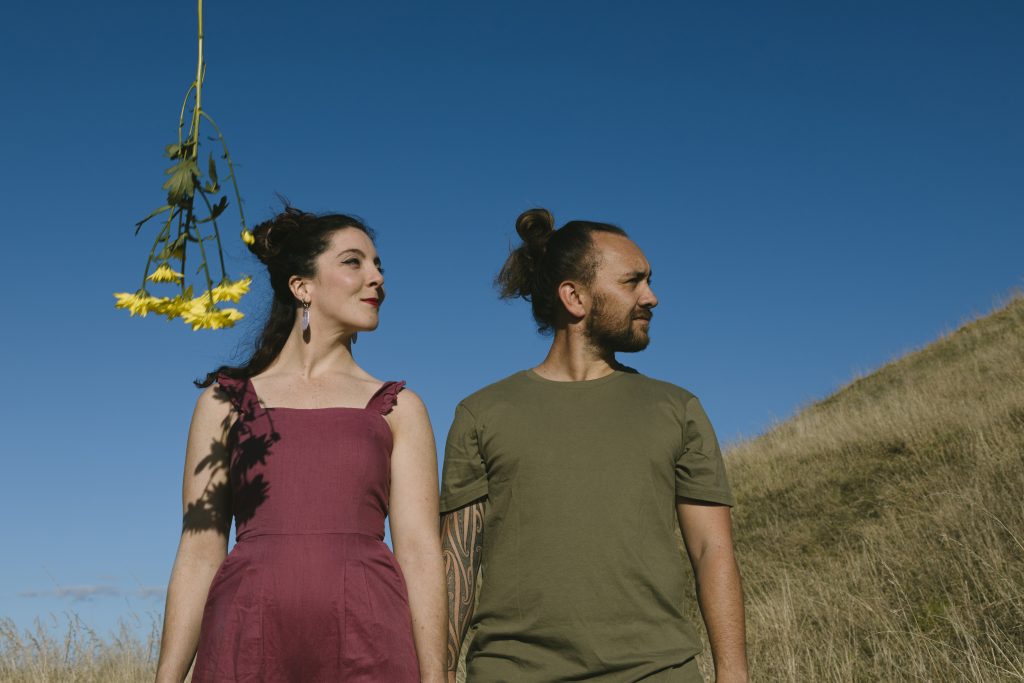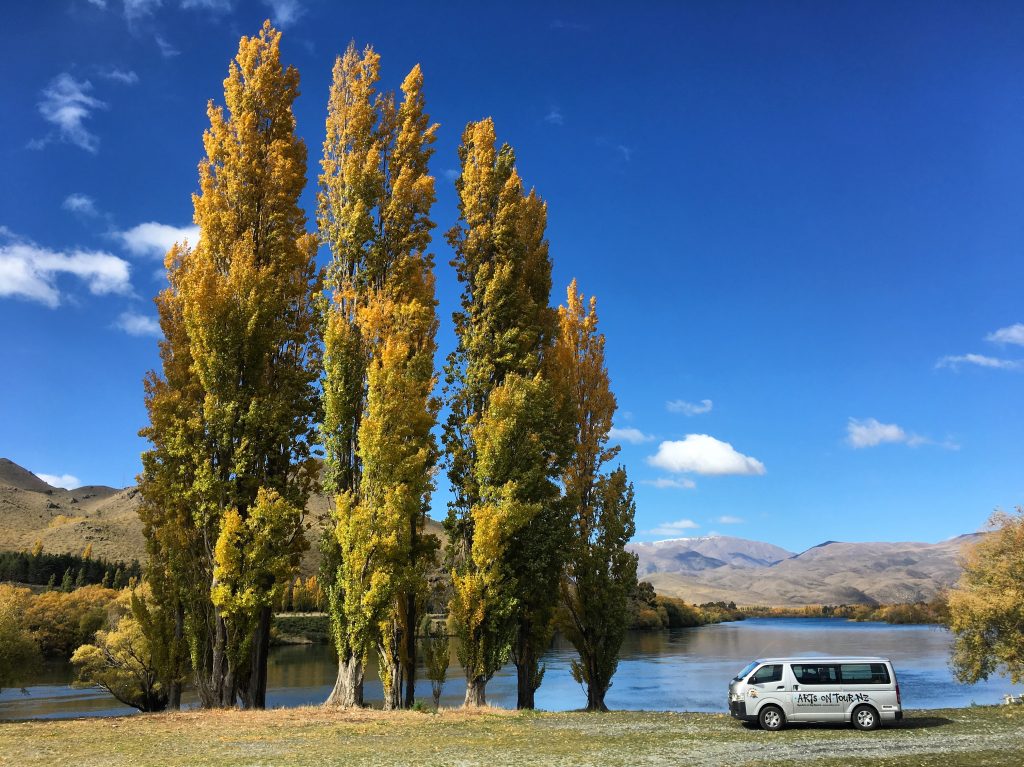The Arts on Tour van brings laughter, birdsong and tasteful sex to rural New Zealand.
ACCORDING TO POET, PERFORMER AND COMIC PENNY ASHTON, THE REGIONS ARE HUNGRY FOR SEX. SHE WOULD KNOW, TOO, HAVING TOURED AOTEAROA MULTIPLE TIMES WITH HER ON E-WOMAN SHOW, HOT PINK BITS. IT’S THIS SHOW, WHICH EXPLORES THE HISTORY OF THE SEX INDUSTRY FROM PORNOGRAPHY TO PROSTITUTION, THAT GOT PENNY HEADHUNTED TO JOIN ARTS ON TOUR.
Making an audience happy is one challenge as a self-employed artist. The other major one, apart from maybe writer’s block, is making ends meet. Arts on Tour (AOT for short) is a vehicle (pun intended) to make all the ends meet: the art to the audience, the money to the artist. The AOT artists, be they musicians, poets, actors or anywhere in between, are given the tour van for a month and sent off to the country’s smallest and most isolated wee towns. Think Tarras, Kaitāia and Ōkārito, which boasts the tour’s tiniest venue, with a grand capacity of 30.
Steve Thomas, who got AOT off the ground and on the road in 1995, says it’s not a new concept. “There have always been travelling artists, whether they were troubadours, the circus, small theatre companies or someone going from town to town with movies in their backpack,” he says. Artists used to rock up to mining towns, following the gold and bringing a flavour of the wider arts scene to culture- starved miners. These days, there aren’t as many miners, but there are plenty of regional farming communities. While YouTube has seen to it that they’re not totally cut off, Steve says there’s more demand than the tour itself can satisfy.
“PLAYING IN AUCKLAND IS LIKE PUSHING SHIT UPHILL.”
One performer in demand is Penny Ashton (pictured, below), who says it’s been amazing to be part of something that’s uprooting the grassroots and taking it all over the country. “You just meet the most delightful people. No one’s making a fortune, or any money actually, but what they’re doing is making an effort to bring arts to their small communities,” she says. “It’s usually a group of ladies bringing a plate of sausage rolls, and, you know, you’ve got Bruce behind the bar. It’s a lovely community feel.” Penny, who lives in the big smoke, reckons folks from the regions are more generous than their urban counterparts, too. “People are very appreciative,” she says, “playing in Auckland is like pushing shit uphill.”

AOT has been going for 25 years now, producing up to 200 shows annually for artists like Penny and gathering a loyal regional fanbase. She says one of the best reviews she ever received was from the tour, saying “shows like yours bring spice to life.”
“People out there wanted a different diet. Before, there had been an emphasis on classical music and piano recitals. It was a fairly conservative menu,” Steve explains. So while travelling the country with your art form is not a new idea, what he did was take a new approach – formalise it within the government funded agency, first the Community Arts Council and, later, Creative New Zealand. A quick side note: the money for these arts funding bodies actually comes from the sale of Lotto tickets. So, if you’re an arts fan who may have turned their nose up at a Lucky Dip, perhaps it’s time to adopt gambling as a vice. As Steve says, “Buy a Lotto ticket – support the arts.”
As the manager of the tour (which takes a lot of work, so it turns out), Steve’s never actually done a month in the van – until now. Come November, he’s hitting the road with New Zealand’s current Poet Laureate, David Eggleton. “I’m really looking forward to it. I’ll be David’s supporting act, and I can see what’s actually going on out there in small towns and venues, too.”
He says when you live in a remote place, to have somebody come in from elsewhere can be both inspiring and encouraging. “It’s something that provides a stimulus from outside, provides some ideas and values that the artists carry with them.” The feedback echoes his sentiment, with rave reviews from Hokitika to Whitianga. Plus, it’s an experience for the artists. Remember Ōkārito? Their 30-seater venue, Donovan’s Store, is the oldest wooden building in the South Island, according to Steve, and has wonderful acoustics.
While Steve’s written poetry for more than 50 years, the aforementioned workload of arts administration has relegated it to the backburner. “My thing is to deliver poetry as lyrics to music if possible, in a combination of chanting, speaking and song. I say I was rapping before it was invented,” he says, before quickly insisting that he is definitely not a rapper.
He was in a band called The Batteries in Dunedin in the eighties, where he learnt to project his voice over drums and bass. “We really rocked the Casbah,” says Steve, and adds that his stuff is quieter and more introspective these days. He does want to find out how to appeal to young people, though. “I would like to reach a younger audience with the tour – show kids that there really is a whole side of the arts that can change your understanding of the world.”
This hope is becoming a reality for him, thanks to the popularity and strength of musical duo Aro, whose AOT tour, scheduled for March 2020, has become known as ‘The Tour Covid Couldn’t Stop’.

Husband and wife Charles and Emily Looker were surprised at how quickly they gained a following with kids and whanau.
They write songs in both English and Te Reo. “We’re a Pākehā-Māori combination,” says Emily, “Charles being Māori and me being Pākehā.”
They met at music school in Auckland in 2013, and played their first gig at her great aunty’s retirement home. Apparently, the old folks could see the sparks flying before they did. Emily explains that Aro, which roughly translates to taking notice of what’s around you, is all about identity. In 2019, they released an album called Manu, which was entirely inspired by the native birds of Aotearoa. It was written while they lived in a van for two years, and it’s some of these songs that’ve been a hit with the kids. “Instead of just waiting for an idea to float by, we used the birds as inspiration for the starting point of each song. Then we’d go and find out what it was and research stories about that bird in te ao Māori,” says Emily. The song ‘Kereru’, for instance, about the fat-breasted native wood pigeon who loves to get drunk off berries, carries a message about everything in moderation.
As part of their album tour, Emily and Charles ran school workshops with singing, songwriting, and kōrero about the music industry. Unfortunately, when the global pandemic came into play, their AOT tour became a little less interactive. “We were really looking forward to it – it honestly seemed like a dream to have it all organised for us,” Emily says, so when a virtual tour was suggested, they went for it.
The Facebook Live tour took place on the same dates and times that the real-life one was planned for, and each show was named and promoted for the town on the schedule. Emily says that while it was obviously a lot harder to do the storytelling without an audience to engage with, it was cool to perform and still be able to connect with people from across the country. Like most of the cooped- up world, she loved tuning in to all the various artistic antics and expressions captured in the virtual sphere. “It’s been really beautiful, actually, to see the creative stuff that came out of the lockdown period for people.”
“I’VE ALWAYS HAD AMAZING AUDIENCES IN INVERCARGILL AND THEY’RE QUITE FILTHY, WHICH IS DELIGHTFUL.”
Theatres, venues and cinemas may all have closed their doors, but the people kept on making art. After all, as Penny reiterates, “It’s hugely important and it’s been very interesting to dissect what was considered an essential service at this time.” Her own April tour with AOT was postponed until October 2021. “I think we all got sick of watching Netflix and started craving that mutual connection.” Penny says people want to think about things, and they just want to laugh. “It’s amazing what laughing together can do to people in a room and how giddy they all are after.”
The giddy crowds are what keep her going, but of course, she’s had her fair share of ‘clinically dead’ ones, too. “Everywhere I’ve been, I’ve had wonderful crowds and shithouse crowds. It’s astonishing how audiences can react so differently to the exact same material.” She says she’s never had a shit crowd in Southland. “I’ve always had amazing audiences in Invercargill and they’re quite filthy, which is delightful. Riverton? Smashed it.”

Although AOT have sent big names, the likes of Hopetoun Brown, Don McGlashan and Marlon Williams, around Aotearoa, they’re still limited with what they can do. “We’re not big money or big agency,” says Steve. “It’s a small, two-person operation of myself, and Michelle doing accounts. But we’re very efficient with those resources.” Penny, who’s been self-employed in the arts for 20 years, and is also a wedding celebrant, says the trick to making a living in this country as an artist is to have fingers in pies. “I do have quite a few strings to my bow – I do improv, theatre shows, writing, marry people and run the poetry slam at WOMAD.”
For Emily and Charles, coming to a space where they’re able to make a living from music has been a real journey, and is more than they could have dreamed of. “It’s our passion, our hobby and the biggest mahi that we do. We even bought a house last year! Which is crazy because we were just a couple of artists in a van,” she says.
It’s artists in a van, though, that continue to bring laughter, birdsong and tasteful sex to rural New Zealand. It’s humble, and it’s real, and it keeps the arts alive in every corner of the country. As Aro like to say, Aro mai, Aro atu, Aroha: to face, to be faced, to love.
GEORGIA MERTON

